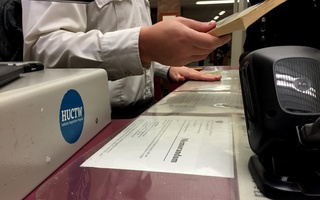In preparation for contract negotiations that will tentatively begin in the next three weeks, leaders of the Harvard Union of Clerical and Technical Workers convened with University administrators and faculty during two “pre-negotiation” information meetings focused on health care last week, according to HUCTW Director Bill Jaeger.
Jaeger originally predicted that contract negotiations would begin in late March, but he said Wednesday that HUCTW and the University have only begun assembling negotiating teams in the last two weeks, informally meeting to discuss the “content, schedule, and structure” of the upcoming talks.
{shortcode-b2969e1f66730a7b0644bb1925d3a1821827c21f}
The “pre-negotiation” sessions held last week, which separately featured Economics professor David M. Cutler ’87 and School of Public Health professor Meredith B. Rosenthal, each drew around 50 participants and focused on healthcare issues, Jaeger said. He added that they served as “warm-ups” for official negotiations.
In a newsletter from University Executive Vice President Katie N. Lapp, HUCTW and University meeting organizers said in a joint statement that the information meetings addressed “the use and impact of patient cost-sharing features in employer-based health plans,” as well as “promising new approaches by employers for managing the total cost of health care.”
“We’ve had some difficulty with healthcare issues in the past few years, and there’s certainly the possibility that these negotiations will be challenging on some of the issues about the health plans,” Jaeger said. “To start by getting exposed to some new ideas together, union and management people, was actually invigorating.”
At the meetings, Cutler and Rosenthal presented recent trends in healthcare, utilizing case studies from other large employers regarding healthcare plans and policy, Jaeger said. Other topics of discussion included the possible implementation of greater wellness programming as a new initiative and the impact of increased patient cost sharing.
“It’s wonderful that we have that kind of expertise right here, and we can talk to these faculty members who are trusted both by the union and by Harvard management and really by the community at large,” said Amanda H. Wininger, a member of the HUCTW executive board and negotiating team. “I think it was a real show of good faith. I think if we could continue in that vein, we would have a really interesting conversation about what happens next with health care at Harvard.”
Jaeger echoed Wininger’s sentiment and stressed the benefit of drawing on the University’s faculty for negotiation preparation.
“I think we agreed all around we were looking for a way to hit the refresh button, and we’re hoping that this did that pretty well,” Jaeger said.
The HUCTW negotiations come a semester after University administrators formally unveiled changes to the University healthcare plan for faculty and nonunion staff last September, citing the burden of rising healthcare costs. The plan included reduced premiums and introduced deductibles for the first time, prompting outcry from members of the Faculty of Arts and Sciences, some of whom called the new plans “regressive.”
While the health benefits changes for faculty and nonunion staff do not extend to HUCTW, Jaeger said that health care will be a focus of the union's upcoming negotiations.
University spokesperson Jeff Neal could not be reached for comment.
—Staff writer William C. Skinner contributed reporting to this story.
—Staff writer Emma K. Talkoff can be reached at emmatalkoff@college.harvard.edu.
Read more in University News
As Divest Blockade Continues, Protesters Await ResponseRecommended Articles
-
 Harvard Union Hosts Panel on Reducing Healthcare Costs
Harvard Union Hosts Panel on Reducing Healthcare Costs -
 Harvard and Union Negotiate as Deadline Approaches
Harvard and Union Negotiate as Deadline Approaches -
 Past Contract Deadline, Union Appeals to Public
Past Contract Deadline, Union Appeals to Public -
 Harvard and Union Continue Contract Renegotiations
Harvard and Union Continue Contract Renegotiations -
For Many Employees, Health Benefits Premiums Will Rise in 2017Many of Harvard’s employees and faculty will see an average 7 percent hike in their healthcare premium costs in 2017.













